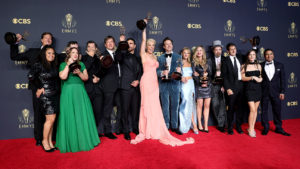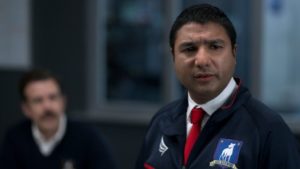Incluvie Film Fest 3rd Place Winner: ‘Warmth’ Review
This film is a splendid mix of mediums, but its strength lies in its simplicity and beautiful message of closeness.
Incluvie Foundation Gala - Learn More
Long-time fan, first-time writer- Ted Lasso has given me lots of reasons to rejoice since its first season release in 2020. However, its general lack of inclusion gave me cause for pause when I sat down to sing my praises via the Incluvie Written Word. I’m happy to report, however, that after devouring its second season, there are new and fresh reasons to love the Lasso. Now that the main characters have been established, the writers have taken the opportunity to explore previously benched background characters and what they lend to the story. The development of existing characters and the addition of some new ones have surely placed Ted Lasso on some sort of an Incluvie A-OK list.

Kansas College Football coach Ted Lasso and his assistant Coach Beard are given the chance to coach Football in England for a Premier League team: AFC Richmond. In the most extreme Fish out of Water setup one could imagine, Ted not only has to learn the rules to a completely new sport well enough to lead this deflated team to victory, but also win over an entire community of super-fans who have very little faith in his abilities. For some context on season one, check out this recap.

The evolution of this story shows that series creators and stars (Jason Sudeikis, Brendan Hunt, and Joe Kelly) have really put forth some effort to differentiate Ted’s journey from some other stories we commonly see in media. Starting out as a series of NBC commercials, it’s easy to observe that this would land as an Incluvie -1 had it been translated to the series as-is. But the awards and accolades (including a Peabody in 2021) were instead garnered by a show that gave attention to topics such as toxic masculinity and mental health in season one. While the overall trajectory of Richmond’s redemption following their relegation stays on course in season two, the team’s objectives act as a vehicle for larger, more character-driven themes.
Sam (Toheeb Jimoh) has graduated from ‘joyful tidbits’ in season one to all-out leading man material. His character is not only successful, talented, kind, and respectful, but is also shown to be an agent of change and activism within the Club. When a new sponsor aligns itself with the team, Sam learns that the company poses a huge threat to his home country of Nigeria’s environment and well-being. Sam takes it upon himself to use his platform to make a statement about his disapproval of the sponsor, with the support of his team and bosses. At the time this was written in the summer of 2020, writers, as well as Jimoh, reflected on Nigerian protests against the government to properly convey what gives an outcry for change its legs once people start to take notice. The attention and due diligence given to this storyline is something that Jimoh appreciated, as well as the decision to make Sam the public image for this cause within the show.
Not for nothing, but Sam is also on the menu this season as a desirable hunk and lovable heartthrob. His character is really one to watch as he is given the chance to explore how much depth he adds to the overall story as he becomes an integral part of this season.

Rebecca (Hannah Waddingham) is Richmond’s owner and Ted’s boss. She has outgrown her role in season one as the scorned and villainous ex-wife and is now reaching new heights as a shining display of women in powerful positions. Her supportive and uplifting friendship with Keeley Jones (Juno Temple) demonstrates two successful women who have a personal and professional relationship free of judgment or competition, something that is seldom shown because many believe it to be impossible. She is also seen mentoring her young goddaughter on what it takes to be a strong leader throughout one episode. Rebecca has stepped back from playing the victim to her ex-husband Rupert’s vindictive and manipulative tactics and instead focuses her energy on success and being the bigger person. Her divorce as a motivation for her antagonism has run its course, and as opposed to writing her as a Sue Sylvester-Esque consummate villain with ever-thinning incentivization and dimension, she is on a path to growth and healing. This immediately struck me as something that may inspire viewers to overcome poor treatment and hardships of their own. Rebecca’s diverging path also makes way for new adversaries with lessons of their own to learn…

Star-player Jamie Tartt (Phil Dunster) and newly-promoted Assistant Coach Nate (Nick Mohammed) are both exploring their relationships to power and success and what that means to their team in season two. Jamie is learning humility and how to overcome his harsh and loveless examples of masculinity in his upbringing. This lends an entirely new perspective to the character as he continuously shows dedication to self-improvement and introspection as the audience learns more about him. The seeds that were planted for the evolution of this hot-head in season one have now grown into some major character development that we can sink our teeth into. The payoff for Jamie’s poor choices is a gift that keeps on giving throughout the season. Nate on the other hand is beginning to grasp the important role that confidence plays not only in his career but in his personal life. The way we are used to seeing Nate is flipped on its head as he navigates a different way of carrying himself, and this road is a rocky one. Though in many ways, this show is overly-optimistic- almost to a sickening degree- the transition that Nate’s character is going through is definitely a bitter reality that a lot of young men will face. Both Jamie and Nate’s ultimate goal is to be a contributor to their team’s success but the journey is not at all a straightforward one.

The addition of this new character, to a certain extent, seems like a tool to de-construct only to re-construct our main character, Ted. However, Dr. Sharon Fieldstone is nevertheless a capable, intelligent, and layered character that narrowly avoids the throws of tokenism. Sarah Niles plays the character as a straight-shooting professional who is an exceptional sport’s psychologist. The classic Lasso-ism of This character’s hardened exterior is no match for Ted’s charm is in full swing here, but done so in a way where we learn more about both characters as complex beings. Dr. Sharon’s dry wit is the perfect complement to her goofy surroundings and she lends such a unique tone to the humour and sensitivity of the show.

I do admire that season two of Ted Lasso was more diverse than season one, but there is still a lot more work to be done here. At the end of the day, Sudeikis does play yet another white man in a power seat, using his charm and influence to convert everyone to his style of thinking. While the cheerfulness is a much-needed relief from the darkness of the 2020s thus far- I’m not in a position to ignore this overwhelming aspect of the show- it is still dominated by white dudes who continuously pull focus, and is primarily written by that same group of white dudes– or so you might think. Typically only the aforementioned male creators are called upon for interviews- occasionally featuring showrunner Bill Lawrence or Roy Kent actor/writer Brett Goldstein. But, fun fact, talented comediennes, writers, and producers such as Jamie Lee, Leann Bowen, and Ashley Nicole Black have also brought their expertise to the table and must be acknowledged for the incredible and fresh cast of characters they contributed to one of the best shows of the year.

Related lists created by the same author
This film is a splendid mix of mediums, but its strength lies in its simplicity and beautiful message of closeness.